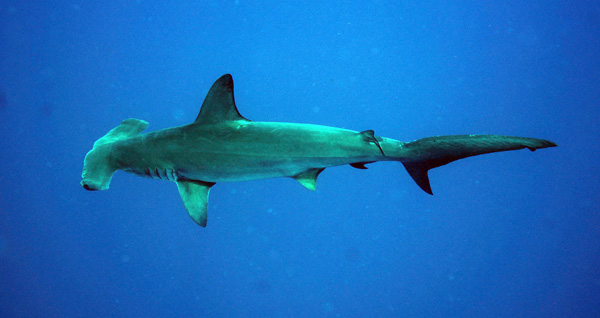On Saturday afternoon, a hammerhead shark bit kayaker Dylan Marks in the leg off Deer Creek beach in Malibu. While fishing for yellowtail, he dangled his foot in the water from his kayak and was bitten.
“The kayaker was 1.5 miles offshore when a 10-foot hammerhead shark bit one of his lower legs about 2:30 p.m.”, said Lidia Barillas, public information officer with the Los Angeles County Fire Department’s Lifeguards Division. “It was a bite and release,” Barillas said. “Nothing severe but a very deep wound.”
A fisherman spotted the injured kayaker, brought him onto his boat and helped him control the bleeding, she said. The kayaker was carried closer to shore and paddled on his own to the shore, where he was met by Los Angeles and Ventura County firefighters. He is expected to fully recover.
Kyle Hudgins said he and his friend, 29-year-old Dylan Marks of Santa Monica, were fishing for yellowtail about 2 miles out from the coast when they noticed the hammerhead circling their kayaks. Marks describes himself as “catch and release shark fishermen” on his Instagram account.
“We saw this fin and then it dove,” Hudgins said. “We didn’t see it for like five minutes and then all of a sudden he (Marks) had his foot over the side and he just got bit. And then he put his foot up on the kayak and he said, ‘Oh, dude. I just got bit!'”
According to the International Shark Attack File there have been an average of just over 60 shark attacks per year worldwide over the last decade. However, on average, less than 5 people per year die from these attacks – so the overwhelming majority of shark attacks are non-fatal. It’s important to note that this wasn’t likely an “attack”, but rather an investigatory taste as to what it is.
Larger individuals are confident in nature and extremely curious. They are much more likely than other marine species to investigate unknown objects in or on the water. Without arms or hands to use, when sharks are unable to identify an object, they sometimes rely on an investigatory bite to gather more information. White sharks are known to have ‘tasted’ a variety of animals and objects, including seabirds, kayaks, boats, plastic bags, and paddle skis.
I short, we humans are not on their menu, which is likely why this shark moved on after discovering that it wasn’t a tuna or seal he was biting into.

